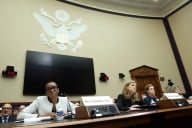You have /5 articles left.
Sign up for a free account or log in.
I am a frequent speaker on diversity issues on college campuses, visiting about 25 a year. And as the Founder and President of an organization called Interfaith Youth Core, it’s no surprise that I pay special, although never exclusive, attention to religious identity.
My standard talk typically highlights the central role religion has played in inspiring social movements, the important social capital faith communities contribute to American civil society and the fact that a nation which is both highly religiously diverse and religiously devout and generally at civic peace is a rare achievement.
Even after I give this type of talk, the most common question I get from students, faculty and administrators alike goes something like this: But isn’t religion responsible for terrible things in the world, like the Holocaust and slavery?
That is precisely the kind of statement that Justice Anthony Kennedy found fault with in the majority decision he wrote for the 7-2 Supreme Court decision in favor of Jack Phillips, who, citing his religious convictions, refused to bake a celebratory cake for a same-sex wedding.
Affirming that “undue disrespect to sincere religious beliefs” and that “subjecting gay persons to indignities” are both problems, Justice Kennedy felt that the Colorado Civil Rights Commission had been sensitive to the latter but not the former.
In other words, the commissioner in question was sensitive to LGBTQ identity but unfriendly to religious identity.
For Justice Kennedy, evidence of “clear and impermissible hostility toward … sincere religious belief” could easily be found in statements like, “religion has been used to justify all kinds of discrimination throughout history, whether it be slavery, whether it be the Holocaust.”
Which is to say, precisely the kind of statements I hear about religion on many of the campuses that I visit. It happens with such regularity that I am starting to wonder whether this is not ancillary to the approach to identity and diversity issues on many college campuses, but rather a part of it. To put the question somewhat more bluntly: in certain segments of higher education, is bias against religion a feature, not a bug?
Do otherwise laudable diversity efforts that consider a range of important issues with respect to race, gender and sexuality generally view religion as the problem, or part of it?
I am far from the first person to note this curious dynamic. George Marsden, for example, has long pointed out that bias against religion is now the unspoken norm across huge swaths of American higher education.
If this is in fact the case, then it is puzzling, because religious communities have been involved in so many efforts that people in higher ed generally find admirable – from refugee resettlement organizations to prison reform – that it doesn’t make sense to highlight the negative aspects of religion rather than the positive aspects.
What would it look like to approach religion from the positive angle? Let’s look at slavery and the Holocaust, the examples used by the Colorado civil rights commissioner that Justice Kennedy cites. Yes, religion has been involved in racism, colonialism and slavery, but it also played an animating role in abolitionist movements and freedom struggles. You certainly don’t get figures like Dorothy Day, Martin Luther King Jr, Ella Baker, Archbishop Desmond Tutu, Badshah Khan or Mahatma Gandhi without their respective faiths.
And there were religious dimensions to the Holocaust, but among the most famous resisters of National Socialism in Germany were heroic figures like Dietrich Bonhoeffer, a Lutheran pastor educated at Union Theological Seminary.
A question college administrators might want to ask themselves: if one of our graduates were on the Colorado Civil Rights Commission and heard the Masterpiece Cakeshop case, what remarks about religion would s/he be most likely to make -- the part about religion’s role in slavery, or religion’s role in abolition?
When people in higher ed talk about race, gender and sexuality, we take pains to highlight the positive dimensions of those identities. The manner in which being black, or female, or gay is empowering for an individual, the contributions that those communities have made to history and contemporary culture.
Let’s treat religious identities with the same respect, appreciation and seriousness on our college campuses, from first year orientation to the senior capstone seminar. After all, how can you call yourself an educated person if the only thing you know about an entire category of human civilization – religion – is the bad stuff?
We should do this both because religious traditions, communities and individuals deserve it. And also because, if we don’t, our prejudice might cause other identities we care about to become collateral damage, as the Supreme Court has just affirmed in the Masterpiece Cakeshop case.





